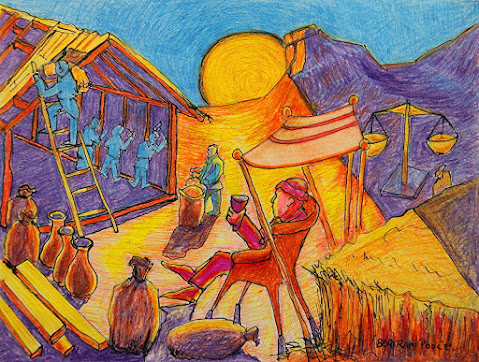When you are invited by someone to a wedding banquet,
do not recline at table in the place of honor.
In this world we do not always see those who exalt themselves being humbled and those who humble themselves being exalted. But this is the counterintuitive way that the kingdom works. The greatest in the kingdom are not those who exalt themselves, but rather those who let themselves become like little children (see Matthew 18:1-4), those willing, like Jesus, to be the servant of all (see Mark 10:44-45). There will be a great reversal when we meet the Lord, whether at our own death or at his second coming. Then the artificial place assignments which we contrive for ourselves, based on our sense of comparative status and worth, will give way the assigned seating of the marriage banquet of the lamb.
‘My friend, move up to a higher position.’
Then you will enjoy the esteem of your companions at the table.
We are called to learn that our comparisons with others don't provide us with a good basis for knowing our value. Not even if we're comparing our love and fidelity to Christianity to that of others can comparisons determine our worth. Jesus teaches us that we must be open to learn the truth of our value, not by insisting on it ourselves, but by receiving it from the host. Our value comes as a gift of grace, and it is by humility that we receive it. This happens not only at the end of our lives. We can experience it as a daily reality.
It may also be understood, even in this life, for daily does God come to His marriage feast, despising the proud; and often giving to the humble such great gifts of His Spirit
- Saint Bede
Paul himself understood that the ways which he had previously used to assert his own value were no longer those that mattered.
Indeed, I count everything as loss because of the surpassing worth of knowing Christ Jesus my Lord (see Philippians 3:8-10)
Only because Paul knew that his value was found in Christ was he totally free to be used by God in any way that God desired.
Christ will be magnified in my body,
whether by life or by death.
For to me life is Christ, and death is gain.
If I go on living in the flesh, that means fruitful labor for me.
Even a very spiritual Christian might be so caught up in longing "to depart this life and be with Christ" that he would refuse to "remain and continue in the service of all". He wouldn't state it out loud, but there could be an implicit belief that he was too valuable for the simple and humble works of mercy that can be performed on this world, deserving already of the complete beatific vision. Paul himself did desire to depart in see the face of Christ, but he did not therefore insist on this place at the head of the table. He let love itself draw him to that which was "more necessary". Doing so ensured that others too would share in "the joy in the faith" of which the wedding banquet will itself be the culmination.
I went with the throng
and led them in procession to the house of God.
Amid loud cries of joy and thanksgiving,
with the multitude keeping festival.















